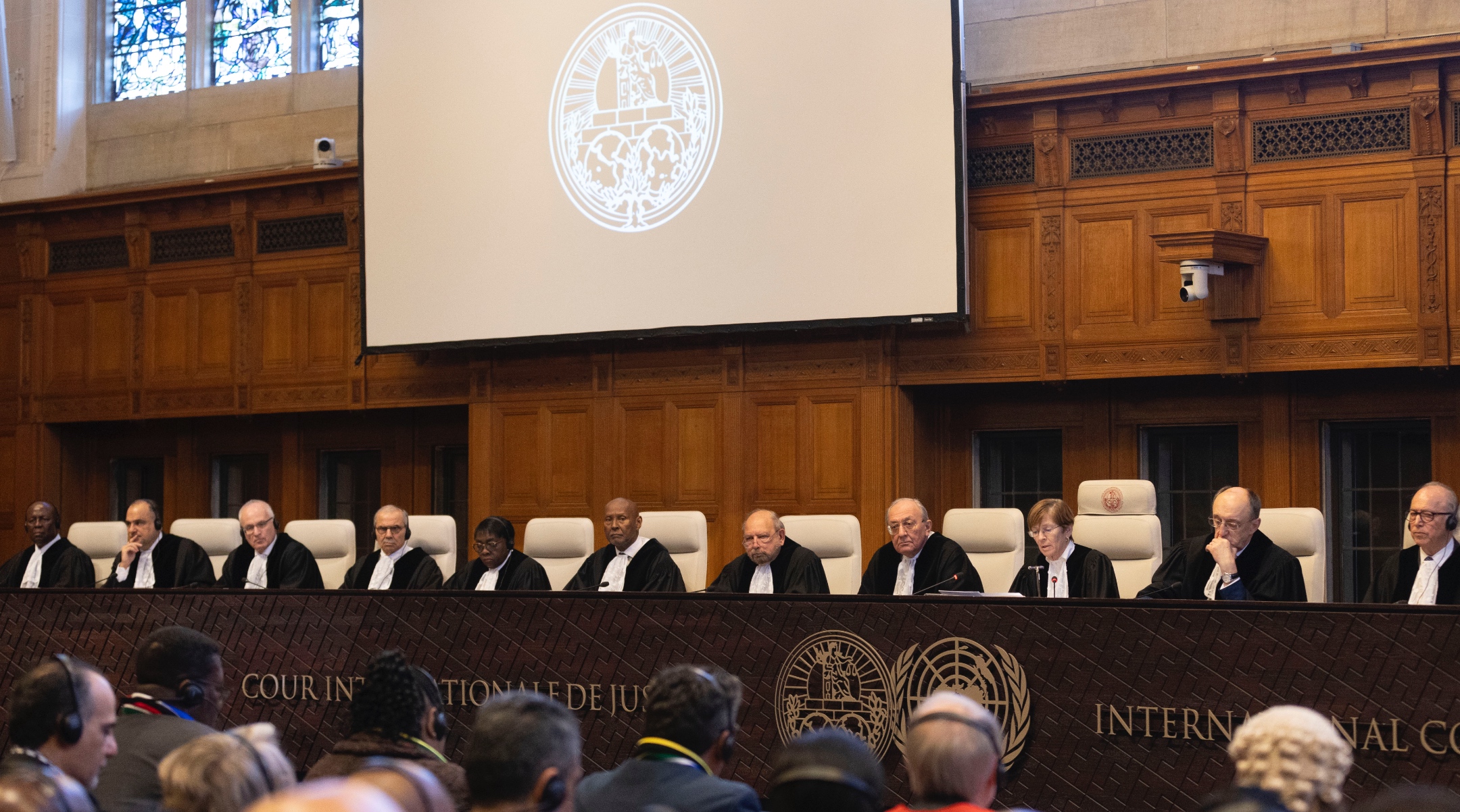International Court of Justice rules that some allegations of Israel committing genocide are ‘plausible’
The International Court of Justice stopped short of ordering a stop to fighting

The International Court of Justice (ICJ) delivers an order on South Africa’s genocide case against Israel in The Hague, Jan. 26, 2024. (Michel Porro/Getty Images)
(JTA) — The International Court of Justice ruled that South Africa’s claims that Palestinians are at risk of genocide, and that they merit protection, are “plausible.”
But the court stopped short of ordering a stop to the fighting.
“In the court’s view, the aforementioned facts and circumstances are sufficient to conclude that at least some of the rights claimed by South Africa and for which it is seeking protection are plausible,” said the ruling read in court Friday by Joan Donoghue, an American who is one of 17 judges considering the case. “This is the case with respect to the right of Palestinians in Gaza to be protected from acts of genocide and related prohibited acts.”
Israel must report back to the court in a month, based on which the court will decide whether to issue a final ruling in the case. But Friday’s ruling was a milestone in the case, which opponents of Israel hope will provide an imprimatur to their claims that Israel is committing war crimes. Israel contested the case in part because it was founded in the wake of the Holocaust and rejects that its war against Hamas meets the definition of a genocide.
The ruling repeatedly made clear that the court had not found evidence of genocide, only that South Africa, in bringing the case, had made a plausible case that the Palestinians deserved protective measures from genocide.
The court said measures to protect Palestinians that Israel has already taken, and to prosecute officials for incitement, are “to be encouraged” but are not enough.
The operative part of the ruling requires Israel to carry out protective measures that the government says already are underway, including taking all measures to prevent harm to civilians, to allow in humanitarian assistance and to prosecute officials for incitement to genocide. Israel is to report back to the court within a month.
The ruling cited statements by Israeli leaders as examples off language that could be seen as “dehumanizing,” including quotes by Defense Minister Yoav Gallant, President Isaac Herzog and Energy Minister Yisrael Katz. Israel has said the relevant quotes were removed from context, were descriptive rather than prescriptive, or were made by officials — like Katz — who are not members of the war cabinet and do not affect decision making.
Aharon Barak, the Israeli former Supreme Court chief justice whom Israel named to the court under the rules of the proceeding, was one of two judges who voted against the key provision requiring Israel report back to the court within a month. The other was Julia Sebutinde, a Ugandan judge on the court.
Notably, the court refrained from ordering specific stops to military action, short of what many of those advocating for a genocide ruling were hoping for, pointing to the more than 25,000 Palestinians killed in the war, according to the Hamas-run Gaza Health Ministry. The court also emphasized that the war was started when Hamas invaded Israel from Gaza on Oct. 7, killing more than 1,200 people, and that more than 130 of the hostages abducted that day remain captive.
Israel is a party to the Genocide Convention which founded the court, but the court has no enforcement mechanism. However, should Israel ignore the court’s ruling, that could serve as a predicate for other nations to boycott Israel or to seek prosecution of its officials. The United States has said that the case South Africa brought lacks merit.
This article originally appeared on JTA.org.
A message from our Publisher & CEO Rachel Fishman Feddersen

I hope you appreciated this article. Before you go, I’d like to ask you to please support the Forward’s award-winning, nonprofit journalism so that we can be prepared for whatever news 2025 brings.
At a time when other newsrooms are closing or cutting back, the Forward has removed its paywall and invested additional resources to report on the ground from Israel and around the U.S. on the impact of the war, rising antisemitism and polarized discourse.
Readers like you make it all possible. Support our work by becoming a Forward Member and connect with our journalism and your community.
— Rachel Fishman Feddersen, Publisher and CEO

























